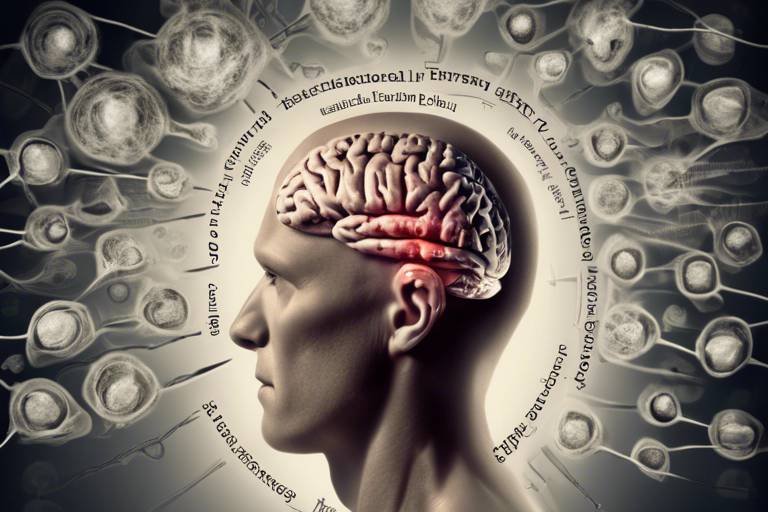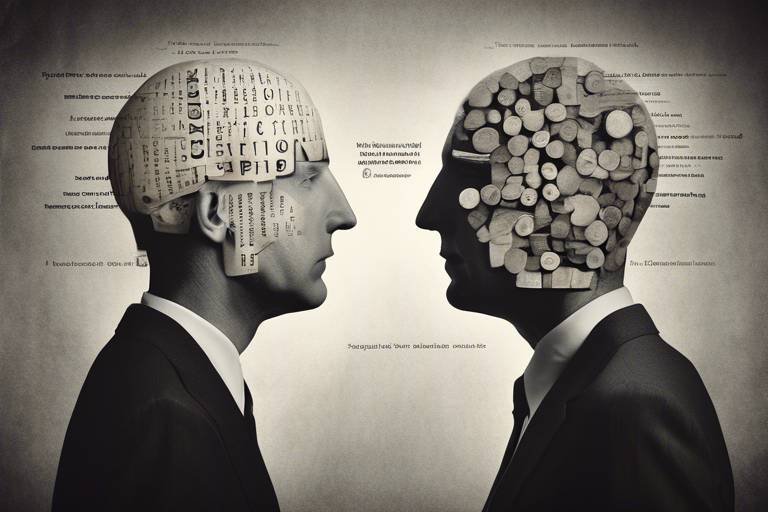The Epistemological Approach to Neuroscience
This article explores the intersection of epistemology and neuroscience, examining how knowledge is constructed and understood within the context of brain function and cognitive processes. It's fascinating to consider how our understanding of knowledge is not just a philosophical endeavor, but one deeply rooted in the biological workings of our brains. How do we know what we know? What mechanisms in our neural architecture allow for the construction of knowledge? These are the questions that bridge the gap between philosophy and science, revealing profound insights into human cognition.
Understanding the basic principles of epistemology is crucial for exploring how knowledge is defined, acquired, and validated in the realm of neuroscience. At its core, epistemology is the study of knowledge—its nature, sources, and limits. Think of it as a framework that helps us navigate the complex landscape of what we consider to be true. Just as a map guides a traveler through unknown territory, epistemology provides a structure for understanding how we come to know things. In neuroscience, this means delving into how our brains process information and how that processing shapes our perceptions of reality.
Neuroscience plays a significant role in understanding how knowledge is formed, stored, and retrieved, providing insights into cognitive processes and learning mechanisms. Imagine your brain as a vast library, where each book represents a piece of knowledge. Neuroscience helps us understand how these books are written, organized, and accessed. For instance, the mechanisms of synaptic plasticity illustrate how experiences can alter the connections between neurons, effectively updating the library's catalog. This dynamic nature of knowledge acquisition underscores the importance of both biological processes and experiential learning in shaping our understanding of the world.
Examining cognitive processes, such as perception and memory, reveals how the brain contributes to the formation of knowledge and our understanding of the world. Perception acts as the gateway to knowledge; it is through our senses that we gather information about our environment. Our brains then interpret this sensory data, constructing a coherent picture of reality. Memory, on the other hand, serves as the storage system for this knowledge. Just as a librarian organizes books for easy retrieval, our brains categorize and store memories, making it possible for us to access and utilize knowledge when needed.
Neuroplasticity illustrates how the brain adapts and reorganizes itself, affecting how we learn and acquire new knowledge throughout our lives. This remarkable ability to rewire itself means that learning is not just a one-time event but a lifelong journey. Imagine your brain as a city under constant construction, with new roads and buildings being added as you gather experiences. This adaptability is crucial for personal growth and development, allowing us to continuously refine our understanding of the world.
Emotions significantly impact our ability to retain and recall information, highlighting the interplay between emotional states and cognitive processes in knowledge acquisition. When we experience strong emotions, our brains are more likely to encode those memories deeply. Think about the last time you felt ecstatic or devastated; chances are, you can recall those moments vividly. This emotional connection to memory underscores the importance of a holistic approach to learning, where both cognitive and emotional elements are considered.
While neuroscience offers valuable insights, it also faces limitations in explaining subjective experiences and the complexities of human consciousness. Despite our advances in understanding brain functions, the essence of what it means to "know" or "experience" remains elusive. Neuroscience can map the brain's activity, but it cannot fully capture the richness of personal experiences, thoughts, and feelings. This gap invites a deeper philosophical inquiry into the nature of consciousness and the subjective quality of knowledge.
The ethical considerations surrounding neuroscience raise questions about the implications of knowledge gained through scientific inquiry, particularly in terms of privacy, consent, and the potential for misuse. As we gain deeper insights into the workings of the brain, the potential for ethical dilemmas increases. For instance, how do we ensure that advancements in neuroscience are used for the betterment of society rather than for manipulation or control? This ethical landscape is as complex as the neural networks we study, demanding careful consideration and dialogue.
Exploring how neuroscience informs philosophical discussions about knowledge, reality, and consciousness can deepen our understanding of both fields and their implications for human experience. By integrating insights from neuroscience, we can refine philosophical debates about what it means to know something. This collaboration between disciplines encourages a richer dialogue about the nature of existence and the human experience, ultimately leading to a more nuanced understanding of ourselves.
As neuroscience continues to evolve, its relationship with epistemology will likely expand, opening new avenues for understanding the nature of knowledge and human cognition. With advancements in technology, such as brain imaging and artificial intelligence, we are on the brink of uncovering new insights into how we learn, remember, and know. This exciting frontier invites us to reconsider long-held beliefs about knowledge and cognition, suggesting that our understanding of the mind may be just beginning to unfold.
- What is the relationship between neuroscience and epistemology?
Neuroscience provides insights into the biological processes behind knowledge acquisition, while epistemology examines the nature and limits of knowledge itself. - How does neuroplasticity affect learning?
Neuroplasticity allows the brain to adapt and reorganize itself, facilitating lifelong learning and the acquisition of new knowledge. - What role do emotions play in memory retention?
Emotions enhance memory retention by creating stronger associations with experiences, making it easier to recall emotional events. - What are the ethical concerns in neuroscience?
Ethical concerns include privacy, consent, and the potential misuse of neuroscientific knowledge for manipulation or control.

The Foundations of Epistemology
Understanding the basic principles of epistemology is crucial for exploring how knowledge is defined, acquired, and validated in the realm of neuroscience. At its core, epistemology is the study of knowledge—its nature, origin, and limits. It raises fundamental questions: What is knowledge? How do we know what we know? Is knowledge absolute or subjective? These inquiries are not just philosophical musings; they have profound implications for how we interpret neuroscientific findings and their impact on our understanding of the mind.
To grasp these foundations, we must first recognize that knowledge can be categorized into different types. For instance, a priori knowledge is independent of experience, while a posteriori knowledge is dependent on empirical evidence. This distinction is pivotal when we consider how neuroscience contributes to our understanding of knowledge acquisition. By studying the brain's mechanisms, we can uncover how experiences shape our perceptions and beliefs, leading to a more nuanced view of knowledge itself.
Moreover, epistemology delves into the justification of knowledge. Justification refers to the reasons or evidence that support our beliefs. In neuroscience, this can be particularly fascinating. For example, when we learn something new, our brain undergoes changes at a cellular level—synapses strengthen, and neural pathways are formed. This biological basis provides a compelling justification for our knowledge, as it ties our cognitive processes to physical changes in the brain.
In the context of neuroscience, we must also consider the role of perception. Our sensory experiences inform our understanding of the world, but they are also subject to biases and errors. This is where epistemology intersects with neuroscience, as both fields seek to understand the reliability of our perceptions. For instance, the phenomenon of optical illusions demonstrates how our brains can misinterpret sensory information, leading us to question the accuracy of our knowledge. Such insights compel us to ask whether we can ever attain true knowledge, or if we are forever bound by our cognitive limitations.
As we dive deeper into epistemology, we encounter the notion of constructivism, which posits that knowledge is constructed rather than discovered. This perspective aligns closely with findings in neuroscience, particularly regarding how learning occurs. Our brains do not simply absorb information; they actively construct knowledge based on our experiences and interactions. This dynamic process underscores the importance of context in understanding knowledge acquisition, as different environments can lead to varied interpretations and understandings of the same information.
Ultimately, the foundations of epistemology provide a framework for examining how knowledge is intertwined with our cognitive processes. By integrating insights from neuroscience, we can develop a more comprehensive understanding of how we acquire, validate, and sometimes misinterpret knowledge. This intersection not only enriches our grasp of both fields but also invites us to reflect on the very nature of reality and our place within it.

The Role of Neuroscience in Knowledge Acquisition
Neuroscience plays a pivotal role in unraveling the intricacies of how we acquire knowledge. Imagine your brain as a complex library, where every book represents a piece of information or a memory. Each time you learn something new, it’s like adding a new title to this library. But how does this process actually work? Through a combination of cognitive processes, brain structures, and biochemical reactions, neuroscience sheds light on the fascinating journey of knowledge acquisition.
At the heart of this journey lies the concept of neural pathways. These pathways are like highways in your brain that connect different areas responsible for processing information. When you learn something new, your brain forms connections between neurons, creating a network that makes it easier to retrieve that information later. This phenomenon is known as synaptic plasticity, which refers to the ability of synapses (the junctions between neurons) to strengthen or weaken over time. The more you engage with a particular piece of knowledge, the stronger these connections become, enhancing your ability to recall that information.
Furthermore, neuroscience has identified various brain regions that play crucial roles in different aspects of knowledge acquisition. For instance, the hippocampus is essential for forming new memories, while the prefrontal cortex is involved in higher-order thinking, decision-making, and problem-solving. Understanding these areas helps us appreciate how knowledge is not just a static entity but a dynamic process influenced by various cognitive functions.
Additionally, the role of neurotransmitters cannot be overlooked. These chemical messengers facilitate communication between neurons and are vital for learning and memory. For example, dopamine is often associated with reward and motivation, which can enhance our ability to learn. When you achieve something or understand a concept, dopamine is released, reinforcing the behavior and making it more likely that you will engage with that knowledge again in the future.
One of the most exciting aspects of neuroscience is its ability to illustrate the connection between emotion and knowledge acquisition. Emotions can significantly influence how we learn and remember information. For instance, when you experience strong emotions, the brain releases hormones that can enhance memory consolidation, making it easier to recall that information later. This is why you might remember a particularly emotional event much better than a mundane one. The interplay between emotion and cognition highlights that knowledge acquisition is not just a rational process but also deeply intertwined with our feelings.
In summary, neuroscience provides invaluable insights into the mechanisms of knowledge acquisition, revealing how our brains are wired to learn and remember. By understanding the roles of neural pathways, brain structures, neurotransmitters, and emotions, we gain a clearer picture of how knowledge is formed, stored, and retrieved. This understanding not only enriches our appreciation of the human mind but also informs educational practices and strategies for effective learning.
- How do neural pathways affect learning?
Neural pathways facilitate the communication between neurons, making it easier for the brain to retrieve information and enhance learning. - What role does emotion play in knowledge retention?
Emotions can enhance memory consolidation, making it easier to recall information associated with strong emotional experiences. - Can knowledge acquisition be improved?
Yes, by engaging with information actively, using mnemonic devices, and understanding the emotional context, individuals can improve their ability to acquire knowledge.

At the heart of our understanding of knowledge lies the intricate web of cognitive processes that shape how we perceive, interpret, and interact with the world. Cognitive processes are like the gears of a clock, working together seamlessly to help us construct our understanding of reality. They encompass a range of mental activities, including perception, attention, memory, and reasoning. Each of these processes plays a vital role in how we acquire knowledge, and together, they form the foundation of our cognitive architecture.
To illustrate this, let’s consider the process of perception. It’s the first step in the journey of knowledge formation. When we encounter a stimulus, our brain doesn’t just passively receive information; it actively interprets and organizes it. This is akin to a chef selecting ingredients for a dish; the quality and combination of those ingredients will determine the final flavor. Similarly, our perceptions shape our understanding and influence the knowledge we construct.
Once we have perceived information, the next cognitive step is attention. This process filters what we focus on, allowing us to prioritize certain information over others. Imagine trying to listen to music in a crowded café; your brain is constantly sifting through background noise to hone in on the melody. This selective attention is crucial for knowledge formation because it determines what information we deem worthy of further processing and retention.
After attention comes memory, which can be likened to a vast library where knowledge is stored. Memory is not just a static repository; it is dynamic and reconstructive. When we recall a memory, we are not merely retrieving a file from a shelf; we are reconstructing an experience that may be influenced by our current emotional state, context, and even new information. This is where the interplay of emotions becomes significant, as they can enhance or hinder our ability to retain knowledge.
Furthermore, the process of reasoning allows us to make connections between different pieces of information, forming a cohesive understanding of concepts. It’s like piecing together a jigsaw puzzle; each piece represents a fragment of knowledge, and reasoning helps us see how they fit together to create a complete picture. This cognitive process is essential for critical thinking and problem-solving, enabling us to navigate complex situations and make informed decisions.
In summary, cognitive processes such as perception, attention, memory, and reasoning are fundamental to knowledge formation. They work in tandem, much like a well-orchestrated symphony, to help us understand and engage with the world around us. As we delve deeper into the realm of neuroscience, we begin to uncover the biological underpinnings of these processes, revealing how our brain functions as the ultimate architect of knowledge.
- What are cognitive processes? Cognitive processes refer to the mental activities involved in acquiring, processing, and storing knowledge, including perception, attention, memory, and reasoning.
- How do emotions affect knowledge retention? Emotions can significantly influence our ability to retain and recall information, often enhancing memory for emotionally charged experiences.
- Why is reasoning important in knowledge formation? Reasoning allows us to connect different pieces of information, facilitating critical thinking and problem-solving.

Neuroplasticity, often referred to as the brain's ability to reorganize itself by forming new neural connections, plays a pivotal role in how we learn and adapt throughout our lives. Imagine your brain as a bustling city: with every new experience, it's like building new roads and bridges, allowing for faster and more efficient travel between ideas and memories. This dynamic capacity not only helps us acquire new skills but also allows us to recover from injuries and adapt to changing environments.
When we engage in learning, whether it's picking up a new language or mastering a musical instrument, neuroplasticity is at work. The brain strengthens pathways that are frequently used while pruning away those that are not. This is akin to a gardener tending to a garden: the more attention you give to certain plants (or in this case, neural connections), the more robust they become. Research has shown that the brain's plasticity is most pronounced during childhood, but it continues to be a crucial factor in adult learning as well.
One fascinating aspect of neuroplasticity is its ability to occur in response to both positive and negative experiences. For instance, when we practice mindfulness or engage in positive reinforcement, we can enhance our cognitive functions and emotional well-being. Conversely, negative experiences can also shape our neural pathways, sometimes leading to maladaptive patterns of thinking. This duality highlights why understanding neuroplasticity is essential for educators and mental health professionals alike.
To illustrate the impact of neuroplasticity on learning, consider the following table that summarizes key factors influencing this process:
| Factor | Impact on Neuroplasticity |
|---|---|
| Age | Younger brains exhibit higher plasticity, but adults can still learn and adapt. |
| Practice | Repetitive practice strengthens neural connections, enhancing skill acquisition. |
| Emotional State | Positive emotions can facilitate learning, while stress may hinder it. |
| Environment | Enriching environments stimulate brain growth and new connections. |
In conclusion, the impact of neuroplasticity on learning is profound and multifaceted. It serves as a reminder that our brains are not static; they are constantly evolving. By understanding and harnessing this incredible ability, we can foster environments that promote lifelong learning and adaptability. So the next time you feel challenged by a new concept or skill, remember that your brain is ready to grow, adapt, and thrive!
- What is neuroplasticity? Neuroplasticity is the brain's ability to reorganize itself by forming new neural connections throughout life.
- Can adults experience neuroplasticity? Yes, while neuroplasticity is more pronounced in children, adults can also experience significant changes in their brain structure and function through learning and experience.
- How does emotion affect learning? Emotions play a crucial role in learning; positive emotions can enhance memory retention, while negative emotions can impede the learning process.
- What are some ways to promote neuroplasticity? Engaging in new experiences, practicing mindfulness, and maintaining a stimulating environment can all promote neuroplasticity.

Have you ever noticed how certain memories stick with you longer than others? Perhaps it's that moment of joy when you graduated or the sadness of losing a cherished pet. These memories are often colored by the emotions we felt at the time, illustrating a fascinating connection between our feelings and our ability to retain information. Emotions play a pivotal role in how we encode and recall knowledge, acting as a sort of emotional glue that binds our experiences to our memory.
Research in neuroscience has shown that when we experience strong emotions, our brains release neurotransmitters like dopamine and norepinephrine, which enhance memory consolidation. This means that emotionally charged events are more likely to be remembered than neutral ones. Think about it: when you feel something deeply, whether it’s happiness, fear, or sadness, your brain is more alert and engaged, making it easier to form lasting memories. This is why we often recall vivid details from significant life events, while mundane daily occurrences fade into the background.
Moreover, the amygdala, a small almond-shaped structure in the brain, plays a crucial role in processing emotions. It helps to prioritize the information that is emotionally relevant, ensuring that we remember what matters most. For instance, if you learn a new skill while feeling excited or passionate, that emotional state can significantly enhance your ability to remember the steps involved. In contrast, if the learning experience is dull or devoid of emotion, the information may not stick as well.
Interestingly, the type of emotion also matters. Positive emotions tend to enhance memory retention, while negative emotions can sometimes hinder it. For example, when we learn in a supportive and encouraging environment, it fosters a sense of safety and openness, which can lead to better retention of knowledge. On the other hand, high levels of stress or anxiety can cloud our cognitive processes, making it difficult to absorb and recall information effectively.
To illustrate this point further, consider the following table that summarizes the impact of different emotional states on memory retention:
| Emotional State | Impact on Memory Retention |
|---|---|
| Positive Emotions (e.g., joy, excitement) | Enhances memory retention and recall |
| Neutral Emotions | Average memory retention |
| Negative Emotions (e.g., anxiety, fear) | Can hinder memory retention |
In conclusion, the influence of emotions on knowledge retention is a compelling area of study within neuroscience. By understanding this relationship, we can harness the power of our emotions to improve our learning processes. Whether it’s through creating emotionally engaging learning environments or recognizing the emotional context of our experiences, we can enhance our ability to retain knowledge effectively. So, next time you’re faced with a learning opportunity, consider how you can make it more emotionally resonant; it might just be the key to unlocking a treasure trove of lasting memories!
- How do emotions affect memory? Emotions enhance memory retention by engaging brain processes that prioritize emotionally relevant information.
- What role does the amygdala play in memory? The amygdala processes emotions and helps prioritize information that is emotionally significant, enhancing memory consolidation.
- Can negative emotions impact learning? Yes, negative emotions like anxiety can hinder memory retention, making it more challenging to absorb new information.
- How can I improve my memory retention? Creating emotionally engaging learning experiences and managing stress can help improve memory retention.

While neuroscience has made remarkable strides in understanding the brain and its functions, it is essential to recognize the limits of neuroscientific knowledge. One of the most significant challenges is the difficulty in quantifying and explaining subjective experiences. For instance, how do we measure the feeling of joy or the sensation of pain? These experiences are deeply personal and can vary widely from one individual to another. Neuroscience can map brain activity and identify which areas are engaged during these experiences, but it often falls short of explaining the qualitative aspects that define human emotion and consciousness.
Moreover, the complexity of human consciousness poses another barrier. Consciousness is not merely a byproduct of neural processes; it encompasses thoughts, feelings, perceptions, and self-awareness. Neuroscience can provide insights into the mechanisms that underlie these phenomena, but it struggles to capture the full richness of conscious experience. This limitation leads to a significant philosophical question: can we truly understand consciousness through a purely scientific lens, or is there an inherent aspect of human experience that eludes empirical investigation?
Additionally, neuroscientific research often relies on models and theories that may not fully encapsulate the intricate workings of the brain. For example, many studies use animal models to draw conclusions about human brain function. While these models can provide valuable insights, there is a risk of oversimplification. The human brain is unique, and what holds true for one species may not necessarily apply to another. This discrepancy raises questions about the generalizability of neuroscientific findings and their applicability to real-world human behavior.
Another significant limitation is the potential for over-reliance on neuroscience to explain complex social and psychological phenomena. For example, attributing behaviors solely to brain chemistry can lead to a reductionist view that ignores the influence of environmental, cultural, and social factors. Understanding human behavior requires a more holistic approach that considers various elements, including
- Biological factors
- Social contexts
- Personal experiences
Finally, the ethical implications of neuroscientific advancements also highlight the limits of knowledge in this field. As we uncover more about the brain, questions arise about privacy, consent, and the potential for misuse of this knowledge. For instance, how do we protect individuals from potential manipulation based on their neural data? The intersection of neuroscience with ethics is an area that requires careful consideration, as the implications of our findings can have profound effects on society.
In summary, while neuroscience offers valuable insights into the workings of the brain, it is essential to acknowledge its limitations. The subjective nature of human experience, the complexity of consciousness, the challenges of generalization, and the ethical considerations all contribute to a nuanced understanding of what neuroscience can and cannot explain. As we continue to explore this fascinating field, it is crucial to remain aware of these boundaries and to approach our findings with a sense of humility and curiosity.
- What are the primary limitations of neuroscience? Neuroscience struggles to fully explain subjective experiences, the complexity of consciousness, and often relies on models that may not generalize well to humans.
- How does neuroscience intersect with ethics? As neuroscience advances, ethical concerns arise regarding privacy, consent, and the potential misuse of brain data.
- Can neuroscience fully explain human behavior? No, human behavior is influenced by a variety of factors, including biological, social, and personal experiences, making it essential to adopt a holistic approach.

When we dive into the world of neuroscience, we often find ourselves marveling at the incredible capabilities of the human brain. However, with great power comes great responsibility, and this is particularly true in the realm of neuroscience. The ethical implications surrounding this field are vast and complex, raising questions that can make even the most seasoned scientists pause and ponder. For instance, as we uncover the secrets of how our brains function, we must consider the ethical boundaries of such knowledge. Are we prepared to handle the consequences that come with understanding the mechanics of thought and emotion?
One of the most pressing concerns is the issue of privacy. As neuroscientific techniques advance, we gain the ability to access and interpret brain activity in ways that were once thought to be the stuff of science fiction. Imagine a world where someone could read your thoughts or emotions through a brain scan. This prospect raises profound questions about consent and the right to keep our mental states private. Should individuals have the autonomy to control who has access to their neurological data? The line between personal privacy and scientific exploration can become blurred, and navigating this territory requires careful ethical consideration.
Additionally, we must address the potential for misuse of neuroscientific knowledge. For example, the application of neuroscience in marketing and advertising can lead to manipulative practices that exploit our cognitive biases. If we understand how the brain processes information, could we use that knowledge to unduly influence consumer behavior? The implications are staggering. It’s not just about understanding the brain; it’s about wielding that understanding responsibly. This brings us to the crucial need for ethical guidelines and regulations that govern the use of neuroscientific research and its applications.
Moreover, the intersection of neuroscience with issues of consent and autonomy is particularly significant in clinical settings. Consider patients undergoing treatments that involve neural interventions, such as deep brain stimulation or neurofeedback. The question arises: how can we ensure that patients are fully informed about the risks and benefits of such procedures? Informed consent must go beyond a mere signature; it should encompass a comprehensive understanding of how these interventions might alter one’s cognitive functions or emotional states.
To better grasp the ethical landscape of neuroscience, let’s break down some key ethical considerations:
- Informed Consent: Ensuring that participants in research studies are fully aware of what their involvement entails.
- Privacy and Confidentiality: Safeguarding individual data and protecting mental privacy.
- Potential for Misuse: Addressing how knowledge gained from neuroscience can be exploited for unethical purposes.
- Impact on Identity: Considering how interventions might change an individual's sense of self.
As we continue to explore the intricate relationship between neuroscience and ethics, it’s crucial to foster a dialogue that includes not only scientists but also ethicists, philosophers, and the public. The conversations we have today will shape the future of neuroscience and its impact on society. By addressing these ethical implications head-on, we can pave the way for a responsible and informed approach to the exciting possibilities that lie ahead.
Q: What are the main ethical concerns in neuroscience?
A: The primary ethical concerns include privacy, informed consent, potential misuse of knowledge, and the impact of interventions on personal identity.
Q: How can neuroscience affect our understanding of free will?
A: Neuroscience challenges traditional notions of free will by revealing how much of our behavior may be influenced by brain processes beyond our conscious control.
Q: What role do ethical guidelines play in neuroscience research?
A: Ethical guidelines ensure that research is conducted responsibly, protecting participants' rights and addressing potential risks associated with neuroscientific studies.

When we dive into the fascinating world of neuroscience and philosophy, we find ourselves at a crossroads where the scientific exploration of the brain meets the profound inquiries of human existence. This intersection is not just a mere overlap; it's a dynamic dialogue that challenges our understanding of knowledge, reality, and consciousness. Imagine standing at a junction where the tangible meets the intangible, where the neurons firing in our brains are in constant conversation with the philosophical questions that have puzzled humanity for centuries.
At the heart of this intersection lies the quest to comprehend how our brain processes information and how this processing shapes our understanding of the world. Neuroscience provides us with the tools to explore the mechanics of thought, emotion, and perception, revealing the intricate workings of the mind. For instance, consider how a simple experience—like tasting your favorite food—can evoke memories and emotions that are deeply tied to your personal history. Neuroscience helps us map these experiences, while philosophy prompts us to ask: What does this mean for our understanding of self and identity?
Moreover, the philosophical implications of neuroscience extend into discussions about free will and determinism. If our thoughts and actions can be traced back to neural activity, can we truly claim ownership of our decisions? This question not only invites neuroscientific inquiry but also philosophical debate, as it challenges the very essence of what it means to be human. The implications are profound, suggesting that our understanding of morality and responsibility may need to be reevaluated in light of new scientific discoveries.
One of the most captivating aspects of this intersection is the way it encourages interdisciplinary collaboration. Neuroscientists and philosophers are increasingly working together to explore questions that lie beyond the reach of either field alone. For instance, the study of consciousness is a prime example where philosophical questions about the nature of experience meet neuroscientific investigations into brain function. This collaboration not only enriches both fields but also enhances our collective understanding of the human condition.
As we navigate this complex terrain, it's essential to recognize the limitations of both disciplines. While neuroscience offers insights into the biological underpinnings of thought and behavior, it may not fully capture the subjective experience of consciousness. On the other hand, philosophy provides a framework for understanding these experiences but often lacks empirical grounding. Therefore, the dialogue between these two fields is not just beneficial; it's necessary for a holistic understanding of knowledge and existence.
In summary, the intersection of neuroscience and philosophy is a vibrant and evolving landscape that challenges us to rethink our assumptions about knowledge, reality, and the self. As we continue to explore this exciting frontier, we are reminded that the quest for understanding is a shared journey, one that requires both scientific inquiry and philosophical reflection.
- What is the primary focus of neuroscience?
Neuroscience primarily focuses on understanding the structure and function of the nervous system and brain, including how they influence behavior and cognitive processes. - How does philosophy contribute to our understanding of knowledge?
Philosophy explores the nature, sources, and limits of knowledge, prompting critical thinking about what we know and how we know it. - Can neuroscience explain consciousness?
While neuroscience has made significant strides in understanding brain function, the subjective experience of consciousness remains a complex and debated topic in both neuroscience and philosophy. - Why is the collaboration between neuroscience and philosophy important?
Collaboration between these fields enriches our understanding of human cognition and experience, addressing questions that neither discipline can fully answer alone.

As we stand on the brink of a new era in both neuroscience and epistemology, the potential for discovery is both thrilling and daunting. The future promises to intertwine these two fields even more closely, offering fresh perspectives on how we understand knowledge and cognition. Imagine a world where our understanding of the brain not only enhances educational methods but also reshapes our philosophical inquiries into the nature of knowledge itself. This intersection is ripe for exploration, and several key areas are emerging as focal points for future research.
One of the most exciting prospects lies in the development of advanced neuroimaging techniques. These technologies enable researchers to visualize brain activity with unprecedented clarity. As we delve deeper into the neural correlates of knowledge acquisition, we may uncover the specific brain regions that facilitate different types of learning. This could revolutionize educational practices, tailoring learning experiences to fit the unique cognitive profiles of individuals.
Furthermore, the integration of artificial intelligence (AI) in neuroscience research is set to transform our understanding of cognitive processes. AI algorithms can analyze vast amounts of data, identifying patterns that the human eye might miss. This synergy between neuroscience and AI could lead to breakthroughs in how we comprehend memory, decision-making, and even creativity. For instance, imagine using AI to simulate various learning scenarios and predicting their outcomes based on neural responses. This could not only enhance our grasp of knowledge formation but also pave the way for personalized learning strategies.
Another promising direction is the exploration of consciousness itself. Neuroscience is gradually peeling back the layers of what it means to be conscious, and this has profound implications for epistemology. How do our conscious experiences shape our understanding of knowledge? As researchers probe deeper into the neural basis of consciousness, we may find answers that challenge traditional philosophical notions. This could lead to a more nuanced understanding of subjective experience and its role in knowledge acquisition.
Moreover, the ethical implications of these advancements cannot be overlooked. As neuroscience continues to uncover the mechanisms of thought and behavior, questions about privacy, consent, and the potential for misuse of knowledge become increasingly pressing. For example, if we can map out neural pathways associated with specific thoughts or memories, what does that mean for individual autonomy? These ethical considerations will demand rigorous philosophical scrutiny as the science progresses.
In summary, the future of neuroscience and epistemology is not just about unraveling the mysteries of the brain; it's about redefining our understanding of knowledge itself. As we embrace new technologies and interdisciplinary approaches, we must remain vigilant about the ethical implications of our discoveries. The journey ahead promises to be as enlightening as it is challenging, and it invites us to reconsider the very foundations of what we know.
- What is the relationship between neuroscience and epistemology?
Neuroscience provides insights into how knowledge is acquired and processed in the brain, while epistemology examines the nature and justification of knowledge itself. Together, they explore how we understand and validate what we know. - How can advancements in neuroscience impact education?
Advanced neuroimaging and AI can help tailor educational methods to individual learning styles, enhancing knowledge retention and cognitive development. - What ethical concerns arise from neuroscience research?
As neuroscience uncovers the workings of the brain, issues of privacy, consent, and the potential misuse of knowledge become critical considerations that must be addressed.
Frequently Asked Questions
- What is the relationship between epistemology and neuroscience?
Epistemology is the study of knowledge—how we know what we know. Neuroscience, on the other hand, explores the brain's role in cognitive processes. The relationship between the two lies in understanding how brain functions influence our perception, memory, and ultimately, how we acquire and validate knowledge.
- How does neuroscience contribute to our understanding of learning?
Neuroscience provides insights into the mechanisms of learning by examining how information is processed, stored, and retrieved in the brain. It reveals the cognitive processes behind learning and highlights the importance of neuroplasticity, which shows that our brains can adapt and change in response to new information and experiences.
- What role do emotions play in knowledge retention?
Emotions significantly affect our ability to retain and recall information. When we experience strong emotions, our brains are more likely to encode those memories effectively. This interplay between emotional states and cognitive processes emphasizes that knowledge acquisition isn't just a logical process; it's also deeply tied to our feelings and experiences.
- Are there limitations to what neuroscience can explain about knowledge?
Yes, while neuroscience has provided valuable insights, it has limitations, especially when it comes to subjective experiences and the complexities of human consciousness. Some aspects of knowledge, such as personal insights or philosophical understandings, may not be fully explained by scientific inquiry alone.
- What ethical considerations arise from advancements in neuroscience?
As neuroscience advances, ethical questions about privacy, consent, and the potential misuse of knowledge become increasingly relevant. For instance, understanding brain function could lead to manipulative practices if not handled responsibly. It's crucial to navigate these ethical waters carefully to ensure that scientific progress benefits humanity without infringing on individual rights.
- How does neuroscience inform philosophical discussions?
Neuroscience intersects with philosophy by providing empirical evidence that can inform discussions about knowledge, reality, and consciousness. This collaboration can deepen our understanding of both fields, leading to richer insights into the human experience and the nature of existence.
- What are the future directions for neuroscience and epistemology?
The future of neuroscience and epistemology looks promising as ongoing research continues to uncover new dimensions of knowledge and cognition. As our understanding evolves, we can expect to see innovative approaches to studying the mind, which may lead to breakthroughs in how we understand learning, memory, and consciousness.



















